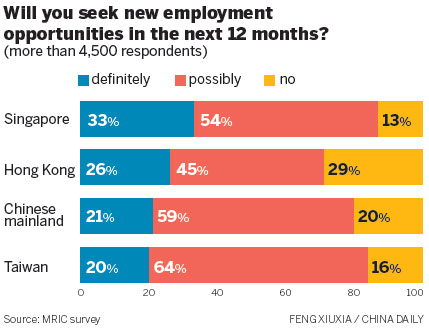Fewer professionals changing jobs
Updated: 2015-01-13 08:36
By Wang Zhuoqiong(China Daily)
|
||||||||

The proportion of professionals who changed jobs in the past 12 months dropped from 18 to 15 percent in China, reflecting both the slowdown of the economy and employers' efforts to retain talent, according to a recent survey.
A majority of respondents who changed jobs got salary increases of up to 20 percent, though some got no increase, according to MRIC Group's survey, known as the 2015 Talent Trends Briefing. It was the fifth annual survey by the organization, a provider of executive recruitment services and talent acquisition solutions that was founded in Hong Kong in 1998.
The survey tabulated responses from more than 4,500 middle or senior managers and professionals working in China and Singapore.
About 24 percent of those who changed jobs got a salary increase of more than 30 percent. It was a sharp drop from the 37 percent of previous years.
As the pace of China's economic growth has slowed, companies have become more reluctant to lure talent through large salary increases, said Angie Eagan, MRIC's managing director for China. And the current employers are making strong counteroffers when they do.
According to the survey, about 24 percent of the respondents accepted retention offers from their current employers, which shows that companies are willing to keep talent they have trained and invested in, the survey found. Employers typically increase salaries by 20 percent or more to retain employees who are considering leaving.
Sara Wang, 34, sought to leave the logistics firm where she worked after being offered a 30 percent increase in her compensation package by a competing company. Her employer countered with a matching pay raise and an additional bonus, despite a slowing of business in 2014.
According to the survey, compensation is the fourth most frequent reason people accept counteroffers. Promotion also ranks high. But the emotional connection with a company is the No 1 reason for accepting a counteroffer from one's current employer in China, the survey found.
"Many companies have developed employee engagement strategies to develop the staff's sense of belonging and to retain key talent," said JB Aloy, senior vice-president at Ipsos, a market research company that jointly conducted the survey with MRIC.
"Beyond base salary, they show that they care. And they are paying increased attention to people's well-being in the workplace."
The survey found that respondents are cautious in light of economic prospects for this year, which translates into slightly more stability when it comes to job changes in the coming 11 months.
"Stabilization is noticeable," said MRIC Group CEO Christine Raynaud. "For the past two years, we have seen more people who say they won't move."
Another survey, conducted by ManpowerGroup, which describes itself as a provider of innovative workplace solutions, said steady hiring is forecast for China during the first quarter, with 11 percent of employers expecting to increase staffing levels and 1 percent expecting a decrease.
Employers in Beijing, Shanghai and Guangzhou all reported the strongest regional hiring pace, with an outlook of more than 12 percent for the first quarter of this year, according to the group's research.
The employers are hopeful about first-quarter hiring, and the outlook is for a slight increase over last quarter, said Zhang Jinrong, managing director of ManpowerGroup.
Zhang said the country's service sector and consumption are becoming the main drivers of the Chinese economy. The government has encouraged efforts to promote steady growth in employment by improving supportive policies, stepping up vocational training and enhancing services.
China's labor market remains resilient, and employment is relatively stable, Zhang said. Labor-intensive service industries are expected to create more jobs than capital-intensive heavy industries.

 Time to become a woman
Time to become a woman
 The world in photos: Jan 5-11
The world in photos: Jan 5-11
 Belting out a tune for Beijing
Belting out a tune for Beijing
 66-year-old woman risks life, limb to pay off debt
66-year-old woman risks life, limb to pay off debt
 Tourists heat up Beijing's frozen lake
Tourists heat up Beijing's frozen lake
 72nd Golden Globe Awards
72nd Golden Globe Awards
 Marching in solidarity: Paris 'unity rally' in photos
Marching in solidarity: Paris 'unity rally' in photos
 We learn what is love from the 10-year-old schoolboy
We learn what is love from the 10-year-old schoolboy
Most Viewed
Editor's Picks

|

|

|

|

|

|
Today's Top News
Rail merger threatened by insider trading allegations
Suspect relieved to be home
Li Ka-shing retakes Asia's richest person crown
Uber gets no grief yet in taxi-app ban
Black box of crashed AirAsia jet retrieved
Experts praise reform of Chinese leaders, past and present
Ambitious course set for global airliner market
Washington's Chinatown in flux
US Weekly

|

|







